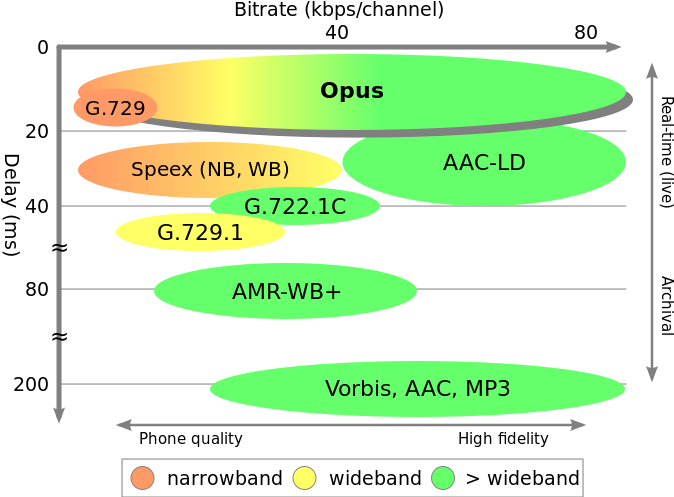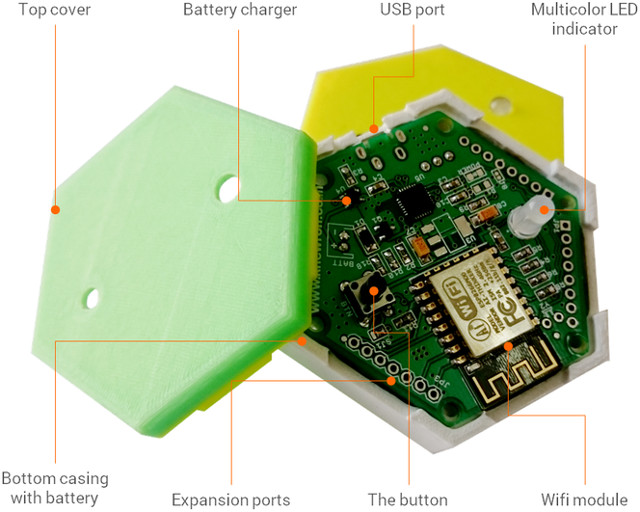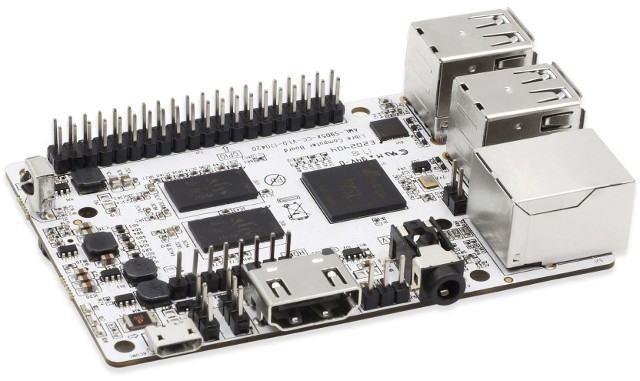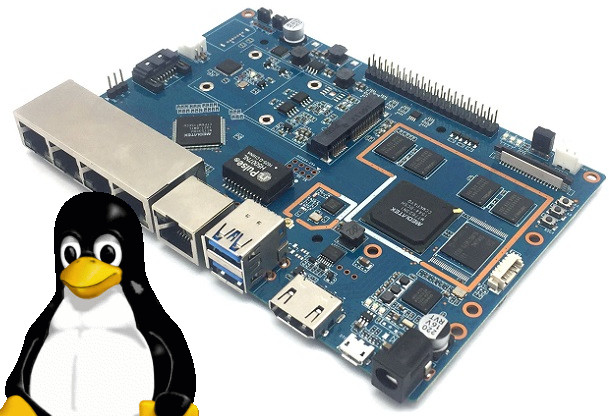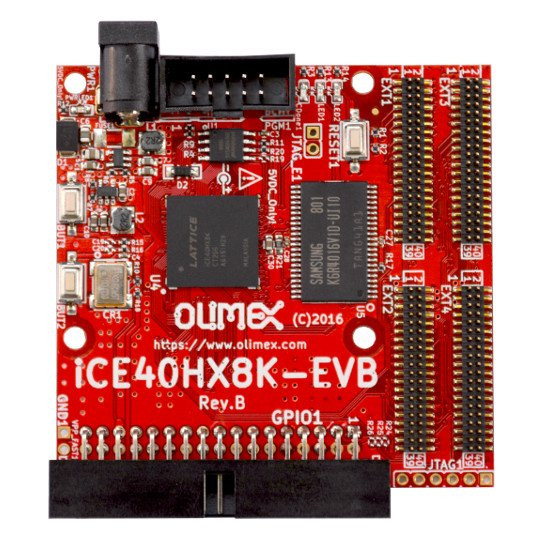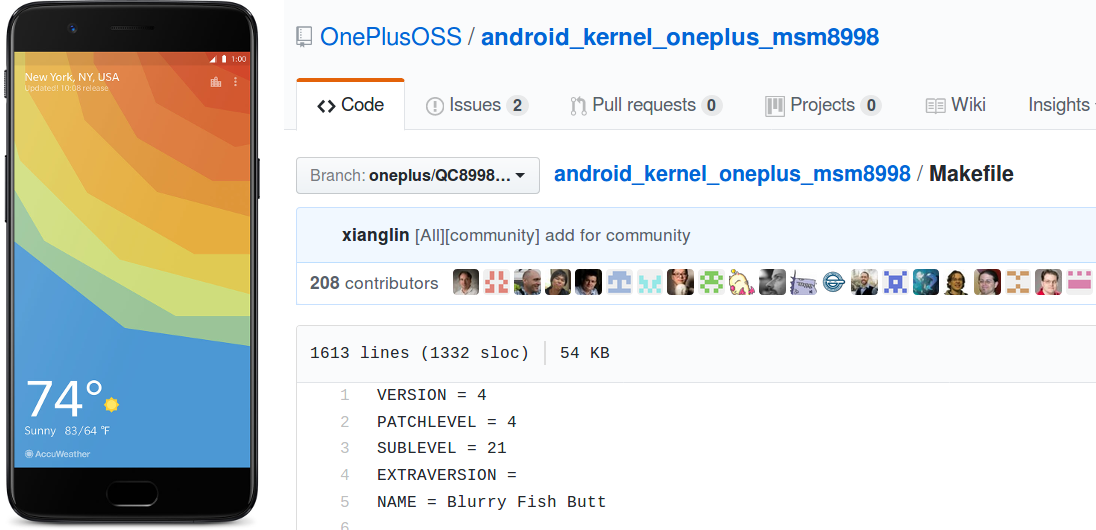The Xiph.Org Foundation has recently announced the release of Opus 1.2 open-source audio codec with ever lower high-quality audio bitrate for music (32 Kbps) and speech (12 Kbps), faster encoding and decoding, and other tweaks to the standard and library. If you’ve never heard about Opus or need to refresh your memory, you may want to read my previous article about Opus Open Source Audio Codec. The developers improve music quality by “adjusting the bit allocation trim, improving tonality analysis with better frequency resolution, and improving quality on signals with a few very powerful tones”. You can compare Opus 1.0, 1.1 and 1.2, and MP3 at different bitrates on Xiph website. You’ll need a browser that supports Opus and MP3 in HTML5 for this to work (Chrome, Firefox, and Opera do), or you may hear another sample as if Opus support is missing the file will be played as a […]
1btn is a Battery Powered Open Source ESP8266 WiFi Button
If you have some WiFi power switch like Sonoff TH16 at home, you’d normally control them using a mobile app or a web interface. This is all good, but getting your phone, unlocking it, and launching the app to turn on or off an appliance is not the most efficient way to operate, and in some cases, some people in the household may not know how to use a smartphone. Physical WiFi buttons are the solution, but there aren’t so many for sale. We’ve seen previously it was possible to hack an Amazon Dash, but it’s not really that flexible, and 1btn could potentially be a better option, as it’s open source and based on Espressif ESP8266 WiSoC. 1btn specifications: WiFi Module – ESP-12F based on Espressif ESP8266 MCU – Microchip Atmel ATmegaxx8 AVR MCU Connectivity – 802.11 b/g/b WiFi up to ~50 meter range USB – 1x USB port […]
Linux 4.12 Release – Main Changes, ARM & MIPS Architectures
Linus Torvalds has just released Linux 4.12: Things were quite calm this week, so I really didn’t have any real reason to delay the 4.12 release. As mentioned over the various rc announcements, 4.12 is one of the bigger releases historically, and I think only 4.9 ends up having had more commits. And 4.9 was big at least partly because Greg announced it was an LTS kernel. But 4.12 is just plain big. There’s also nothing particularly odd going on in the tree – it’s all just normal development, just more of it that usual. The shortlog below is obviously just the minor changes since rc7 – the whole 4.12 shortlog is much too large to post. In the diff department, 4.12 is also very big, although the reason there isn’t just that there’s a lot of development, we have the added bulk of a lot of new header files […]
Libre Computer’s Le Potato Amlogic S905X Development Board Goes for $25 and Up (Crowdfunding)
Up to now there were two notable Amlogic S905(X) development boards: ODROID-C2 and Khadas Vim. Shenzhen Libre Technology Co., Ltd, a Shenzhen startup, is about to bring one more to the market with Le Potato board, aka AML-S905X-CC, powered by Amlogic S905X processor with 1 or 2 GB RAM, and in a form factor similar to the Raspberry Pi 3 board. Le Potato /AML-S905X-CC board specifications: SoC – Amlogic S905X quad core ARM Cortex-A53 processor @ 1.5 GHz with penta core ARM Mali-450MP GPU, and Amlogic Video Engine 10 System Memory – 1GB or 2GB DDR3 RAM Storage – 1x micro SD Card slot with UHS SDR104 support, eMMC module connector with HS400 support Video Output – HDMI 2.0 Port, 3.5mm TRRS “AV” jack with CVBS (480i / 576i) Audio Output – HDMI, AV jack (stereo audio), SPDIF output header, and I2S header Connectivity – 10/100M Ethernet USB – 4x […]
Banana Pi BPI-R2’s U-boot & Linux 4.4 Source Code & MediaTek MT7623N Datasheet Released
Banana Pi BPI-R2 is a multimedia router board powered by MediaTek MT7623N quad core processor with 2GB RAM, 5 Gigabit Ethernet ports, up to two SATA ports, two USB 3.0 ports, HDMI output, and I/O headers. The board is not for sale yet, but the company has recently released the source code with U-boot and Linux 4.4.70, as well as a datasheet for MediaTek MT7623N processor. The source code can be found on Github, so let’s see if we can build it:
|
1 2 3 4 5 6 7 8 9 10 11 12 13 14 15 16 17 18 19 20 21 22 23 |
git clone https://github.com/BPI-SINOVOIP/BPI-R2-bsp cd BPI-R2-bsp/ sudo apt install gcc-arm-linux-gnueabihf ./build.sh ./build.sh NOTICE: new build.sh default select BPI-R2-720P and pack all boards supported boards: BPI-R2-720P BPI-R2-720P configured. Now run `make` This tool support following building mode(s): -------------------------------------------------------------------------------- 1. Build all, uboot and kernel and pack to download images. 2. Build uboot only. 3. Build kernel only. 4. kernel configure. 5. Pack the builds to target download image, this step must execute after u-boot, kernel and rootfs build out 6. update files for SD 7. Clean all build. -------------------------------------------------------------------------------- Please choose a mode(1-7): 1 |
After a couple of minutes, the build would end with:
|
1 2 3 4 5 |
usr/lib/u-boot/bananapi/ usr/lib/u-boot/bananapi/bpi-r2/ usr/lib/u-boot/bananapi/bpi-r2/BPI-R2-720P-2k.img.gz Build success! |
For the very last step, it asks you to login as root / sudoer, which it should not do… But we end up with the images, so at least it builds:
|
1 2 3 4 5 6 7 8 |
ls -lh ./SD/ total 27M drwxrwxr-x 2 jaufranc jaufranc 4.0K Jun 28 10:46 100MB -rw-rw-r-- 1 jaufranc jaufranc 22M Jun 28 10:46 4.4.70-BPI-R2-Kernel.tgz -rw-rw-r-- 1 jaufranc jaufranc 151K Jun 28 10:46 BOOTLOADER-bpi-r2.tgz drwxrwxr-x 3 jaufranc jaufranc 4.0K Jun 28 10:46 BPI-BOOT -rw-rw-r-- 1 jaufranc jaufranc 4.8M Jun 28 10:46 BPI-BOOT-bpi-r2.tgz drwxrwxr-x 4 jaufranc jaufranc 4.0K Jun 28 10:46 BPI-ROOT |
MediaTek has also been active by committing patchsets for MT7623 to the Linux Kernel Mailing List, so mainline Linux is an eventual possibility for […]
IceZero Lattice iCE40 FPGA Board is Designed for Raspberry Pi Zero
Yesterday, we reported about Olimex’s open source hardware iCE40HX8K-EVB board with a Lattice iCE40 (HX8K) FPGA, and today, another iCE40 FPGA board, also open source hardware, appeared in my news feed with Trenz Electronic’s IceZero board specifically designed to be programmed using a Raspberry Pi Zero board. IceZero board specifications: FPGA – Lattice ICE40HX4K with 3520 logic gates, and 80 Kbit memory Storage – SPI Flash for FPGA self-configuration Misc – 3x User LEDs; User Clock: 100 MHz Expansion – 4x unpopulated PMOD Connectors; 40-pin Raspberry Pi female header Dimensions – 56 x 30.5mm (Raspberry Pi HAT Compatible) The board is supported by icoTC open source FPGA toolchain for Windows and Linux, which you can use in Raspberry Pi Zero (W), and other RPi board with a 40-pin header running Raspbian, as explained in that simple example in Github. Trenz electronic only shared part of the documentation, but you’ll find […]
Olimex Introduces 40 Euros iCE40HX8K-EVB Board with Lattice ICE40 FPGA
Last year, Olimex launched their first FPGA board with iCE40HX1K-EVB. The board is very cheap at 22 Euros, but what you can do with it is limited since it only comes with 1280 logic cells. The company has now introduced an upgraded model called iCE40HX8K-EVB with 7680 logic cells, and more I/O headers. Olimex iCE40HX8K-EVB specifications: FPGA – Lattice Semi iCE40HX8K-CT256 FPGA with 7680 logic gates, 960 Logic Array Blocks, and 128 Kbit memory System Memory – 256Kx16 SRAM (512KB SRAM) Storage – 2MB serial flash Expansion 34-pin connector to access FPGA I/Os 4x 40 pin connectors for GPIOs Debugging / Programming – 10-pin “PGM” connector Misc – 2x user buttons, reset button, 2x user LEDs, power & programming status LEDs Power Supply – 5V via power jack Dimensions – 67×65 cm The board is open source hardware with the KiCAD schematics and PCB layout, BoM, and Gerber files available […]
OnePlus 5 Smartphone Linux Kernel & Android Source Code Released
OnePlus 5 is a premium smartphone powered by a Qualcomm Snapdragon 835, 6 to 8 GB LPDDR4x RAM, 64 to 128 GB UFS 2.0 storage and a 5.5″ Full HD display, as well as the usual LTE, WiFi, Bluetooth, GPS.. connectivity. It was launched yesterday for $479 with 6GB RAM/64GB storage, $539 with 8GB RAM/128GB storage, and today, I’ve just read on XDA developers that the company had already released the source code for the phone. Beside the official Google Nexus/Pixel smartphones, many manufacturers will drag their feet before they eventually open the source code that they are legally required to release. Some companies will release the source code as tarballs, which works, but OnePlus has done better with Linux 4.4.21 source code available on Github. You should also be able to get the Android 7.1 Nougat source code as indicated here:
|
1 2 |
repo init -u git://github.com/OnePlusOSS/android.git -b oneplus/QC8998_N_7.1 repo sync |
The source code should lead to improvements […]


